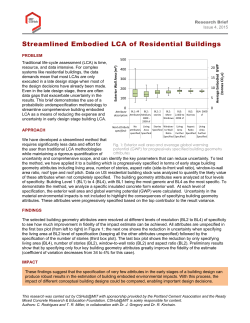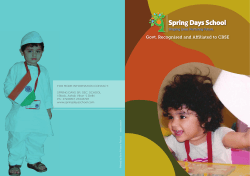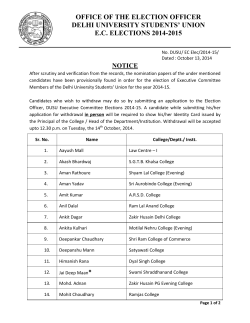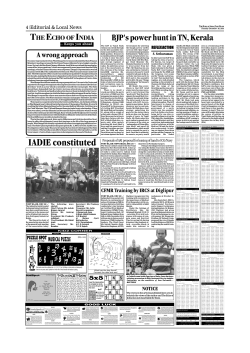
The real development
4 HIMALAYAN MIRROR The real development ENGLISH DAILY PUBLISHED FROM GANGTOK HIMALAYAN MIRROR FEBRUARY 13 2015 VOL 9 NO. 152 Deliver Now: BJP mustn’t re-embrace populism or polarisation tactics after its Delhi debacle The mother of all shellackings means it’s introspection time for BJP. It can hardly take the position that Delhi polls weren’t a referendum on the Centre after building its whole campaign narrative around PM Modi. Voters have shown that acknowledging a mistake, saying sorry, then correcting it is something they respect. But just as damaging as refusing to take notice of the Delhi verdict would be learning the wrong lesson. This is not a referendum against the development, reforms and growth agenda – that’s what got BJP elected to the Centre in the first place. What, then, were BJP’s mistakes? One of them was confusing the global with the local. The PM has an admirable passion for foreign policy and has scored notable successes in it. This will undoubtedly improve India’s long-term strategic environment. But that’s no substitute for issues that matter in a local election. Modi meeting Obama isn’t germane to the average Delhiite battling a hostile urban environment. And wearing an expensive suit reported to be worth ten lakh rupees for the occasion, with his name monogrammed all over it, has a touch of hubris the average Indian voter doesn’t like. Allied to this is another problem. The Modi government always seems to be in campaign mode, with too much emphasis on political projection and hype. But the more it does this, the more the gap with actual performance will grow. People may be tiring of the grandiloquent gesture and perfectly organised political rally, they now want to see delivery on the ground. Jan Dhan Yojana sounds splendid but has it put money in your account? Has Swachh Bharat Abhiyan cleaned up your neighbourhood yet? The big takeaway from the capital’s verdict is that the Centre must raise the bar on its performance. Deliver those governance and economic reforms that will improve India’s investment climate, encourage entrepreneurs, provide new jobs, improve everyday lives. And resist two knee-jerk temptations. First, BJP mustn’t use polarisation tactics to walk away from the Delhi debacle. One Union minister calls non-Hindus haramzade, another pushes Bhagavad Gita as national scripture, the fringe feels more and more emboldened while Modi maintains a Manmohan style silence – this pill isn’t going to work any more. Second, don’t relapse into UPA style populism. Nobody knows better than BJP that it isn’t fruitful. An astute politician like Modi mustn’t misread the writing on the wall. Meanwhile, a hug First there was Arvind Kejriwal the challenger, setting fire to the government’s Lokpal Bill. Then there was Kejriwal the aam aadmi, eating street food, doing the dishes, sporting the now-iconic muffler. Then there was Kejriwal the dharna star, being dragged away by the police from former Delhi Chief Minister Sheila Dikshit’s house and other tourist destinations. Now, there is Kejriwal, the family man. One of the first things the AAP chief did after his famous victory that stalls the Modi wave, wiping out the Congress from Delhi and changing the face of Indian politics, was hug his wife. After introducing Sunita Kejriwal to thousands of exultant supporters, he went on Twitter to thank her for “always being there”. Does Delhi have its first first couple in the Kejriwals? When US President Barack Obama won his second term, the first image that went up was of him hugging wife Michelle, with the caption “four more years”. The closest an Indian politician has come to displaying affection, in recent memory, is to make his wife chief minister when he had to go to prison —- we’re looking at you, Lalu Prasad. While the stately Gursharan Kaur came out for public occasions to accompany husband Manmohan Singh, Narendra Modi prefers to maintain a glacial distance from rumours about his private life. There are sentimental histories about Rajiv and Sonia Gandhi, but she largely stayed out of public life until after his death. The Indian politician, typically male, has always preferred to be seen as the stoic, go-it-alone sort, speaking of a life spent in heroic service to the country. With Kejriwal’s hug, politics is suddenly part of the ordinary struggles of the ordinary politician who cannot do without the support of the partner. The will to win, the desire to succeed, the urge to reach your full potential... these are the keys that will unlock the door to personal excellence. - Confucius EDITORIAL GANGTOK, FRIDAY 13 FEBRUARY 2015 By Gurpreet Mahajan A rvind Kejriwal’s sincere apology for past mistakes and the AAP’s electoral manifesto may have won them some votes, but an emphatic win in 67 of 70 seats was possible only due to the disenchantment with the BJP. When we look at the stunning defeat suffered by the BJP, this is the only possible conclusion. In the general elections that were held just a few months ago, the Congress lost a substantial portion of its vote share and its support base seemed to have moved to the BJP. In this assembly election, the Congress vote share dipped even further, but its sympathisers did not turn to the BJP. This time round, they looked elsewhere and found in the AAP a better alternative. It is difficult to accept this harsh reality. For this reason, many are suggesting that the resounding victory for the AAP is simply inexplicable. There is no doubt that the numbers stacked by the AAP were unexpected; a safe majority had been predicted by pollsters, but a clean sweep was far beyond anyone’s expectation. But it would be a mistake to assume that the unexpected is also inexplicable. Just because we cannot predict accurately does not mean we cannot make sense of why it happened. One must, therefore, analyse the verdict and confront what it says. From the time that Delhi voted in the last general election to this assembly election, nothing much had changed. At that time, and even now, Kejriwal continued to be labelled as a whimsical down the line, they are beginning to look again for a better alternative and Delhi voters have now put their trust and hope in the AAP. Modi had secured number of seats with substantial margins without winning the support of different social groups and sections. So, all of them will expect the party plank on which the BJP contested and won the last general election and it was the rallying call in this assembly election too. All parties spoke of devel- anarchist, a “bhagoda”, someone who could lead a protest but not govern. On the other side, there stood, then and even now, brand Modi with the promise of a strong, confident India, with high growth and world-class cities. So the rhetoric in Delhi around both these elections was much the same; yet, this time it was assessed differently. Against the scam-ridden Congress, Narendra Modi’s persona, his style of campaigning, the promise to deliver good governance and development seemed to convince many voters. Those who were looking for a viable alternative to the Congress moved towards the BJP. Just eight months for the BJP an impressive win by getting 31 per cent of the vote share; Kejriwal has upped the ante by getting 54 per cent of the vote in Delhi. No doubt, the expectations are high and the AAP has a tough job ahead. It has to fulfil the promises it made, sooner rather than later. It has laid out not just policies but tangible things that it would deliver; so people will keep count and maintain a checklist. The opposition will also not let it off the hook or allow the electorate to forget what was promised. The AAP’s task would be made even more difficult by the fact that it would have to walk a tightrope. They could not have won such a large to attend to their specific concerns. Striking the right balance between competing interests will not be easy. Even the AAP’s promise of greater participation for the people through mohalla committees, along with greater say and control over the use of funds in that area, is bound to throw up conflicts and power tussles that would need a great degree of dexterity to resolve. They have an unenviable job before them, but the challenge before the BJP at this moment appears to be even more daunting as it is expected to take a hard and critical look at itself, its agenda and its functioning. Development was the opment, but the voters have shown a preference for the AAP’s understanding of development. They may still want a high growth rate, bullet trains and safe nuclear energy, but what they want even more is that their immediate needs of water, affordable power, housing, better health facilities, cheaper vegetables, be attended to first. Clearly, they seek greater priority for and action on — not simply rhetoric or a blame-game — women’s safety and the accountability of public officials. Peaceful coexistence, religious harmony and less moral policing are also high on their list of preferences. To the Delhi electorate, the AAP seems to be more attentive to these aspects of development while the BJP appears to be on a different page altogether. No doubt, the BJP will go into a huddle pretty soon and introspect. But one thing we have learned by looking at the Congress experience is that a politics based on the personality cult, topdown leadership, with a small and select coterie of the chosen few, does not lend itself easily to course correction. It would be relatively easier for them to comfort themselves and say that this is the result of just one state election. After all, Delhi does not represent India and what surfaces here need not be duplicated elsewhere. All this is certainly true. But the Delhi election is an apt reminder that in a democracy people’s support is always conditional and subject to continuous assessment. Change is not only possible but never far behind. In Delhi, the idea of a clean, corruption-free government, close to the people, focusing on their immediate and most urgent needs, offering safety and security to all, won the day. The AAP became an embodiment of that idea and received overwhelming support. So long as this need remains unaddressed, similar political experiments will continue to surface and people will continue to script similar success stories that may baffle the more established political parties. (Courtesy : Indian Express) The tyranny of hurt sentiment By Dilip Simeon S hirin Dalvi, the editor of the Mumbai edition of Urdu newspaper Avadhnama, has become the latest victim of the running saga over cartoons. Since midJanuary, when she unwittingly published a Charlie Hebdo cover, she has been slapped with criminal charges, her newspaper shut down, its employees rendered jobless, and she herself forced underground. Vicious threats are sent to her via social media. All this is happening despite her printed apology. The police have opposed anticipatory bail on the ground that it would cause a law and order problem (aren’t they paid to deal with such matters?). The man who filed the complaint heads an Urdu journalists’ body. He is cited as saying, “I filed a case against her and I am happy that she was arrested. If she was in an Islamic state, she would have been beheaded as per law.” That the freedom of speech could be so flagrantly attacked in the name of religion is by now a common experience. Self-appointed guardians of faith have attacked our minds with relentless aggression for years. But that someone could wish a horrible death to another human being is itself highly offensive to many of us — and this person thinks it earns him merit in the eyes of Allah. I have no access to the mind of the Almighty, but I can venture to suggest that Allah is more considerate than some of his followers.Hurt sentiment has become the cutting edge of tyranny. It is the perpetually available political tool for preparing “spontaneous” mob violence, violating the law, mobilising illiberal movements and intimidating everyone — especially within the preferred community — who disagrees with communal politics. It becomes worse when responsible individuals glamorise this fake and vicious form of piety. Sentiment appeared in the law in the aftermath of the Rangila Rasul case of 1929, when the publisher Rajpal was murdered in Lahore by a 19-year-old youth named Ilm-ud-din. The boy pleaded guilty, against his lawyer M.A. Jinnah’s advice — this is reported as the only case Jinnah ever lost. The philosopher Allama Iqbal led the funeral ceremony, at which he reportedly declared: “This uneducated young man has surpassed us, the educated ones.” One of preIndependence India’s outstanding thinkers had no qualms in glorifying murder in the name of hurt sentiment. Ilm-ud-Din is now revered as a ghazi in Pakistan. This is akin to the reverence accorded to V.D. Savarkar, a prime accused in the M.K. Gandhi murder case, not to mention the glorification of men like Jarnail Singh Bhindranwale and Nathuram Godse. Section 295-A, which penalises offensive utterances, was framed in the aftermath of the Rangila Rasul case. Jinnah helped frame the act and stressed that it should apply only to cases of deliberate and malicious intent. The misuse of this law in India is well-documented. Pakistan augmented it with the death penalty for blasphemy. Pakistani Punjab’s governor Salman Taseer was murdered by his bodyguard for merely suggesting that the law be re-examined, in the context of the Aasia Bibi case. His killer has now acquired heroic status, and his appeal is led by a former chief justice of Punjab. Instead of advocating the non-violent resolution of conflicts, members of the to beheadings and sharia law, the complainant is creating an ambience of murderous hate around this hapless woman. Can he not see that his behaviour mimics the hateful propaganda directed towards religious regime of the dictator Gaafar Nimiery. We would also profit from a study of the lives of famous Muslims from the national movement, such as Khan Abdul Ghaffar Khan and Maulana Azad; not to elite have added fuel to the flames. A society whose philosophers, lawyers and judges think it fit to celebrate revenge killing is doomed to an infinite spiral of extremism. The topic of blasphemy has always been suffused with blood-thirst. Let us be clear that Dalvi is not merely being harassed by a complainant, who is aided and abetted by a meanspirited police and government. Formal harassment is only part of the story. More significant is the violence that underpins all the arguments, phone calls, arrests, social-media posts, etc. Dalvi is exposed to violence, with the active connivance of the state, which is supposed to protect her. By referring minorities and other vulnerable groups in India? In this case too, a minority is being oppressed. Shirin is a minority of one. Those who oppress minorities themselves have no business complaining about the oppression of minorities. Islamic theology does not always lead in a tyrannical direction. The ideas of the Egyptian professor of religion Nasr Hamid Abu Zayd and the Sudanese thinker Mahmoud Mohammed Taha are worthy of respect. These learned scholars were persecuted for advocating liberal readings of the Quran and hadith. Abu Zayd was forced to divorce his wife and flee Egypt in the mid-1990s. Taha was executed in 1985 by a sharia court under the mention lesser known ones like Bibi Amtus Salam, whom Gandhi used to call his daughter. A war of conscience is underway for the soul of Islam. The Dalvi case is merely the latest example. In July 2013, a lecture by the American Islamic scholar Amina Wadud was cancelled by the Centre for Islamic Studies in Chennai, because of threats received via a text message. The leader of a communal outfit had called the police and threatened an agitation. Instead of providing protection to the event, the police intimidated the organisers, who gave in. Why does the freedom of conscience and speech apply only to providing state protection to petty tyrants and blackmailers, and not to those who wish to criticise religion or to study alternative religious currents? What message do governments send to society by encouraging goondas and oppressing people of mild temper? What will happen to the rule of law if this continues? Would the complainant in the Dalvi case kindly reflect on whether his religion contains some resources for restraint and compassion? Or is it, in his view, a compendium of justifications for working up murderous rage in the faithful? If the latter is the case, he is no different from those who hounded M.F. Husain out of India and who now wish to deify Godse. Whether he knows it or not, he is acting in their interest. His actions will not benefit Islam, rather, fanatics of other brands will be doubly energised. However, if he can find something gentle in his faith, let him use it as inspiration to withdraw the case. Those of us who are more offended by gratuitous violence than by cartoons must defend Dalvi. We must demand that the government provide her with protection, investigate those threatening her (didn’t the police arrest a young woman for Facebook posts at the time of Bal Thackeray’s funeral?), and instruct the state prosecutors to drop the case. We have had it up to our throats with fabricated outrage. We, too, are angry at the police and government repeatedly surrendering their responsibility to protect peaceable citizens from hooligans wearing religious masks. Down with the tyranny of sentiment. (Courtesy : Indian Express)
© Copyright 2025














